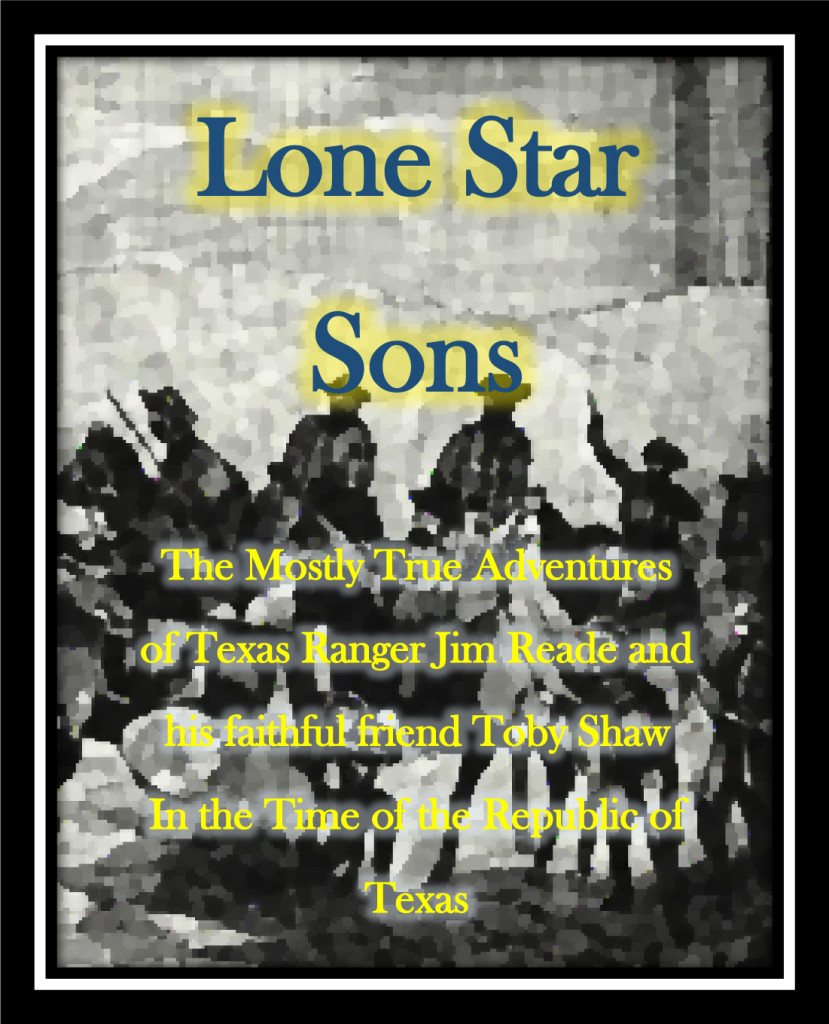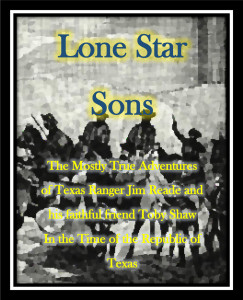(All right – here it is, the first chapter of the next book but one – the Gold Rush adventure that I have always wanted to write. This one takes place in between Book One and Book Two of the Adelsverein Trilogy. Enjoy – I’ll be posting occasional chapters here. )
Chapter 1 – Two Boys
Spring came to the lowlands around San Antonio de Bexar as it always did – with the springs of clear water flowing clear and ice-cold, with meadows of flowers splashed in swaths of yellow, pink and the deep rich blue of buffalo clover as if a reckless artist had chosen to go mad with the paint. Young Friedrich Steinmetz, whom most everyone called Fredi, had come with his brother-in-law’s herd of cattle and three hired buckaroos to sell in the market-plaza in Bexar. Carl Becker’s ranch spanned a stretch of the hills that defined the valley of the upper Guadalupe, where he had built a tall stone house and brought Fredi’s older sister to it some eight years before. The hill country – ranges of limestone hills quilted with oak trees, formed the wall between the grassy and well-watered lowlands, long-settled by white men and Mexicans, and the Comanche-haunted plains of the Llano country. For more than half his life, it had been home to Fredi and his twin brother Johann. They were alike in form, being wiry of build, hazel-eyed and with light-brown hair, but different in character. Fredi was the scapegrace, impulsive and bold. Johann was the clever one; this very spring he was to sail away and study medicine in the Old Country, that country where the twins had been born sixteen and a half years before.
“I want to go and see Johann off when the cattle are sold,” Fredi said, that night when they were less than a day’s journey to Bexar. The sun had already faded to a deep apricot blush in the western sky, and the stars to glimmer pale in the sky overhead. The herd was pastured in a meadow on the bank of Salado Creek, running deep and cold at this time of year. The cattle drank from it eagerly, after a warm afternoon of being chivvied across a dry stretch. Fredi’s brother-in-law Carl Becker helped himself to another piece of journey-bread, and answered through a mouthful. “You’re gonna have to travel on your own, then. I can’t stay long enough from the place to see you to Indianola and back an’ I sure as hell can’t pay your way on the stage.”
“That’s what I planned on,” Fredi answered. “An’ … if I run out of money, I’ll work my way back.”
“That’s the ticket,” Carl Becker grinned. He was a big young man, Saxon-fair and soft-spoken, some fifteen years older than Fredi. They spoke together in German, that language which Carl had from his family, who had been settled in America some three generations longer than the Steinmetzes. “But you better get yourself back as soon as you can – I don’t want to explain to Magda and Vati that I’ve let you loose on the world, all on your own.”
“If Johann is old enough to go study medicine in Germany,” Fredi answered. “Then I don’t see how anyone would mind me making my way in the world. You told me that you enlisted in a Ranger company when you were the age I am in now.”
“That was different,” Carl answered, but didn’t offer any explanation as to why that would be. “And if something happens to you, your sister will skin me alive.”
“She’s all taken up with the baby,” Fredi answered, carelessly. “But I won’t see Johann for years and years, Carl – we’re brothers! I want to see him one more time … we can hurrah in Indianola for all the times we won’t be there with each other.” He fixed Carl with pleading eyes. “I promise I’ll come straight back to the ranch.”
“Promises like that are nut-shells, made to be broken,” Carl answered, with a touch of wry cynicism. “You and Johann are as thick as thieves and I always like to think that he keeps you out of trouble … Go and see him away – but if you do get into a ruckus on your own, I promise I will come down and skin you myself. Especially if I have to bail you out of the cabildo.”
“Excellent!” Fredi exclaimed, joyfully relieved. “As soon as you sell the cattle, then – I’ll take the road towards the coast. Johann and Mr. Coreth were to take passage on the steamer to New Orleans in three weeks. I’ll be back well before mid-summer. You can count on me!”
“I can count on you to be a handful – and that’s what worries me,” Carl answered. More »



Recent Comments